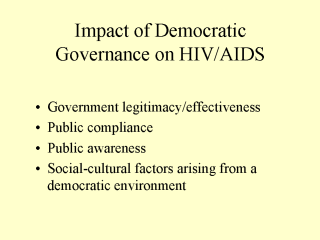 |
Some people
believe that democracies may be better able to respond to this epidemic. This is
complicated, however, by the fact that many of the “success stories” – nations that
have effectively dealt with HIV/AIDS – are not particularly democratic. Democratically-elected
governments enjoy greater legitimacy than other forms of government, and may be better
able to implement difficult or controversial AIDS prevention programs. Public compliance
is generally higher in a democratic society… The openness and free speech enjoyed in a
democratic society may contribute to greater public awareness about HIV/AIDS. A number of
socio-cultural factors related to democracy may also slow the epidemic or mitigate its
impact, particularly social cohesion and a strong and vibrant civil society. |
